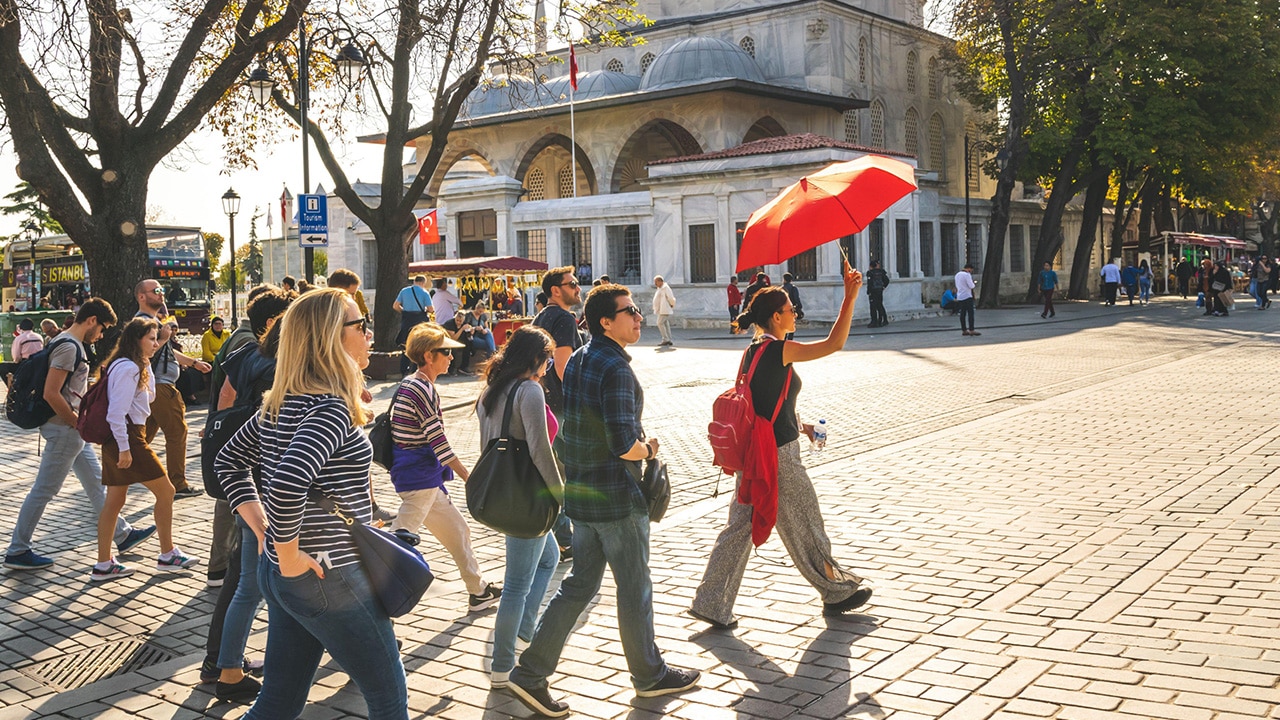Considering taking a group tour? We’ve got the expert advice on how to choose the right tour and get the best value – including how to avoid the extra expense that irks travellers the most.
This article may contain links from our affiliate and advertising partners. When you click on them, or share this content, we may earn a commission. Learn more
My Doc Holiday inbox is filled with questions about group touring, so here, I’m answering the ones that are most common.
I’ve got my eye on a couple of tours but the single supplement is a rip-off. Can the tour company set me up with a travel buddy?
Many tour operators (Intrepid Travel, G Adventures and Explore Worldwide among them) will give you the option of sharing a room with someone of the same gender to avoid paying the supplement. What is the supplement? Industry pricing structure is based on a room charge that’s divided between two people sharing a room, meaning you’ll have to pay significantly more to absorb the cost of the missing traveller if you’d like a room for one.
Obviously, you don’t really get a say on who you bunk up with in these situations (don’t forget to pack those earplugs) so if you’d rather meet and get to know a travel buddy beforehand, you could always post about your intended trip on sites such as Travello or Meetup.
This Bali tour guide is going viral for all the right reasons!
Is it true that group tours are more expensive than doing it on your own?
This obviously depends on the tour you book and what kind of approach you take to spending on holidays when you’re travelling independently. Generally speaking, yes, tours tend to run a little more expensive because a tour company has a significant number of overheads you wouldn’t have to worry about. There are guides and drivers to pay, for a start, insurance premiums to keep on top of, and of course, the tour operator needs to take a cut, since they are a business geared around making a profit, and not a charity.
Essentially, you’re paying someone to do the research, plan your trip and sort the logistics. Your guide will also prevent you from getting ripped off during your travels. So if you factor this all in, you might consider any extra expense worth it.
Joining a group tour can help you avoid falling victim to tourist scams in your destination.
My tour includes optional activities such as hot-air ballooning and snorkelling. Will my travel insurance cover those activities?
The best thing you can do is to comb through your itinerary and take note of all the activities listed, optional and included, before searching for the appropriate level of cover when you buy your travel insurance.
As a guide, most providers will not cover paragliding, rock climbing, abseiling, motorsport or racing, hunting, caving, playing polo or partaking in activities such as running with the bulls. Interestingly, some of the policies I’ve just looked at cover not only hot-air ballooning and snorkelling, but also trekking, cycling, jet skiing and cage diving with sharks. Again, covered activities – as well as potential exclusions – can vary between providers so be sure to check before you buy a policy.
For those keen on participating in heart-stopping adventures on their travels, some insurers offer added extreme sport packs you can buy which generally include activities such as abseiling, whitewater rafting (graded either four or five) and ziplining.
Hot air ballooning over Cappadocia, Turkey.
I’ve found a tour I’m interested in, but I’m not keen on a couple of the longer coach journeys. Could I opt to fly if I organise the flights myself and meet the rest of the group at the next destination?
I had a chat about this one with Brett Mitchell, managing director (Australia and New Zealand) at Intrepid Travel, who explained that flying a leg of their tours is possible (and happens occasionally).
“We’d rather discourage it due to the increased carbon emissions, but we support any customers who choose to make their own travel arrangements at any point during the tour and we ensure to meet back up with them further along in the itinerary,” he said.
So while the short answer is yes, it’s possible to go your own way for some of the journeys, I would also add that it isn’t a move that’s likely to endear you to your fellow group members. One of the best things about travelling as a group – particularly when you’re touring as a small group – is the camaraderie that develops, much of it when you’re driving long distances and getting to know each other as a way to pass the time. If you’re concerned five to seven hours on a coach is too much to handle, be sure to stock up on reading material, pack snacks as well as a card game or two, and mix up the seating arrangements so you always have someone new to speak with.
If you’d rather not engage with others for hours at a time (no judgement), you could also download a couple of movies or a TV series to watch during the drive, or use the time to edit your photos, catch up on work, or learn the local language via Duolingo. I suffer from terrible motion sickness on coaches so I tend to take a Kwells 20 minutes before we depart and doze for much of the journey – a real treat for the poor soul who is forced to sit next to me.
Much of Bhutan is off-limits to travellers, except on guided tours.
I’ve never been on a group tour before but I would consider myself “tour-curious”. Are some destinations better than others when it comes to tours?
This really is a “how long is a piece of string” question because we all have different interests and needs. Some destinations such as North Korea, Tibet, and some areas of Bhutan only allow guided group travel, but group tours are also a good choice if you’re heading somewhere remote or challenging like the depths of the Amazon.
If you have a particular interest (cycling, a burning desire to conquer Everest Base Camp, or wish to visit many destinations in a short period of time), sharing it with like-minded travellers can elevate your experience. Your best bet? Read up on your intended destination, ask yourself what kind of holiday you’re after and whether you feel comfortable and confident going it alone. It’s best to make your decision based on how you answer those questions.
Trekkers en route to Everest Base Camp in Nepal.
I’m keen on doing a multi-country tour of Europe (my first) but I’m undecided whether to go with a group tour or travel independently. What are the pros and cons of group tours?
Motion sickness aside, I’ve enjoyed my fair share of group tours in recent years and among the things I’ve loved about them is the ability to meet and travel with like-minded people from around the globe you otherwise would never have met. Having someone to handle the logistics, plus an experienced local guide who speaks the language, means you can learn about the destination’s culture, history, people and customs, while leaving someone else to navigate any potentially tricky situations. This is particularly useful for travellers who are inexperienced or nervous.
Others – particularly those travelling in remote or challenging environments – cite an added sense of security as another benefit, while some like the ability to pay for the bulk of the trip in advance.
On the downside, if you’re travelling within a group and you happen to have a real tool on your trip, you’re stuck with them for the duration of your holiday. A rigid itinerary that doesn’t allow for serious cultural immersion and the rush, rush, rush nature of some tours can leave travellers frustrated (as can eating meals at decidedly average restaurants prescribed by the tour director). Of course, some travellers are more than happy with this approach but ultimately it depends on your nature, interests and the tour you book.
On tour in the Swiss Alps.
8 things to consider before booking a group tour
You’ve homed in on your destination and have a rough idea of duration and budget. It’s a solid start, but to find your perfect tour, you’ll need to also consider:
● The type of holiday you’re after, whether it be cultural immersion, adventure or a tour that covers all the tourism favourites and landmarks.
● The demographic the tour company caters to. Some skew towards an older crowd, while others are best suited for young adults, for example.
● Modes of travel. Epic coach journeys are not for everyone.
● Comfort level of the tour, with a focus on the style of accommodation you’ll be staying in.
● Group size. Some tours will run with fewer than 10 guests, while others can run upwards of 40 people.
● The pace of the itinerary. Does it offer the downtime and flexibility you want?
● Inclusions. Some tours will only include the basics (accommodation, transport, a few meals and some attractions) while others are all-inclusive. These will be at the pricier end of the spectrum.
● Other travellers’ honest reviews of the tour. You can usually find these on the tour operator’s website, but also on TripAdvisor.










